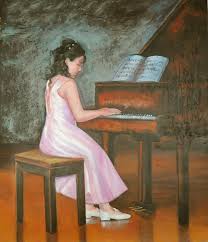Upcoming seminar on teaching intermediate to early advanced students through story telling If you live anywhere near Dunedin, New Zealand, I would love to invite you to join me in the IRMTNZ National Conference, from the 21st -25th, January 2019. I am superpsyched to be presenting in the upcoming IRMTNZ Conference on the 22nd of January, 2019, at 2.50pm. This time I want to share how to engage and motivate students to love… Sonatinas! Here is the title and description of my session: From Sonatina to Cinderella: enhancing expressive playing through story-telling Classical Sonatinas can be perceived by students as old-fashioned and dull. In this session, Melody will use the findings in her recent Master’s research to demonstrate how to incorporate story-telling, modelling and other pedagogical tools to help students engage with the Classical repertoire. She will show how to formulate seemingly unimaginative genres into animating fairy-tales or superhero chronicles, at the same time taking a holistic approach to developing technique, theory and musicianship. Intrigued? Read on to find out more! Any piano teacher of the 21st century would be well aware that Classical Sonatinas may not be the favourite genre of music to learn and play in your studio. There are always the exceptional few that love playing them as much as the next piece, but chances are, most students tend to learn them because “the teacher said I had to do it”, and the remaining few will defiantly avoid the genre at all cost. I once asked a 12 year old student why he didn’t learn the notes of a the new piece for that week, and he said, “I didn’t like the sound of it. It is really old- fashioned.”. Yep, you guessed it, the piece was a Sonatina. So why do some students perceive these mini classical gems as old- fashioned and dull? And is it possible to formulate these seemingly unimaginative genre of music into something kids find exciting to play? In this seminar I am here to explore some answers. First of all, I want to start by saying that I love the Classical Sonatinas and Sonatas. Out of all the genres in Western Classical Music, I just “get” the Classical pieces more than others. Maybe it is because I could always see myself fangirling Mozart if I lived in the 1800’s, or perhaps I just associate them with all the witty and handsome Austenian characters. I am definitely not impartial when it comes to the charm of the music of the Classical Period. Possibly it is my own biases, but I really do think that Sonatinas are indispensable pedagogical pieces for any budding pianists wanting improve their skills and musicianship. Below are just some of the benefits of learning and playing Sonatinas:
As a teacher, I really do not see how it is possible for students to advance smoothly to something like the Pathétique Sonata without having gone through at least two dozen Sonatinas and “entry level” Sonatas. So here are some of the reasons I thought of that might be hindering student’s enthusiasm towards these pieces, compared to the more “popular” genres:
Now, we cannot control what kids are exposed to outside of their piano lessons, but what we can do is to help kids relate to the music they initially find boring and difficult to understand, and turn them into something they can appreciate and love. The beauty of a Sonatina is that because the titles are all the same, we can help children interpret them into a narrative their imagination can fathom and discover. When they can do so, you can instantly see their eyes brightening up and faces starting to beam, as they find themselves suddenly able to bring to life, a previously monotonous scale passage because it is now a part of a meaningful story. Even the same piece of Sonatina can be tailored to suit each individual student.
In this upcoming seminar, I will demonstrate how I help students to create their own exclusive story lines to help them connect with the music, as well as tips on how to use storytelling to improve technique and enrich their theoretical knowledge. I will also include a “fool-proof” guide to help teachers find the most engaging narrative for individual students. Head to the conference website to register: https://www.ivvy.com.au/event/IRMT19/home-page.html A video of my seminar and handouts will be available on my website after the conference – look out for future updates on the blog! Melody
0 Comments
Leave a Reply. |
AuthorThis blog post is by Melody Deng Archives
September 2020
Categories
All
|
|
©2019 East Coast Bays Piano Studio | All Rights Reserved
|



 RSS Feed
RSS Feed